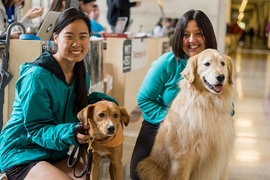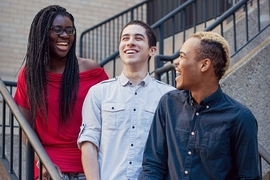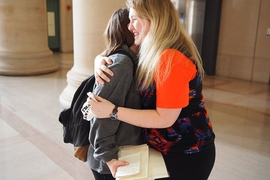If you attended MIT Day of Play or visited MIT Puppy Lab this month, you felt the results of MIT’s MindHandHeart Innovation Fund. In the third and final round of its first academic year, the fund awarded $30,000 in grants to 10 new proposals from a pool of 22 applicants. Winning projects this round ranged widely from public art, to colorful lawn furniture, to high-energy movement classes, to a website, zscore.mit.edu, where students register sleep data.
Each proposal underwent review by the six working groups of the MindHandHeart Initiative; a selection committee comprised of members of the Undergraduate Association (UA) and the Graduate Student Council (GSC); MindHandHeart’s sponsors, the Chancellor’s Office and MIT Medical; and the initiative’s faculty chair, Professor Rosalind Picard of the MIT Media Lab.
Maryanne Kirkbride, MindHandHeart’s executive administrator, announced the winners May 19, at the final steering committee meeting of the academic year. The steering committee includes representatives from the deans for undergraduate and graduate education and student life; Mental Health and Counseling; the Graduate Student Council; the Undergraduate Association; MIT Police; and other key MIT offices.
At the meeting, MindHandHeart leadership thanked the steering committee for their service to the MIT community and reviewed the initiative’s year-one accomplishments: 25 total Innovation Fund projects; the distribution to incoming students of online Kognito training in how to help and support struggling students; the upcoming train-the-trainer "Notice and Respond" workshops for 15 staff this June — with 600 anticipated participants in the coming year; and expanded access to mental health services at Mental Health and Counseling and Student Support Services (S3).
Two of the newest Innovation Fund projects employ creative approaches to mental health support. Jared Berezin’s proposed glass sculpture titled, “Helping You, Helping Others” is an interactive display offering a tangible reminder that help-seeking is common on campus. Berezin, a lecturer in the Writing, Rhetoric, and Professional Writing Program (WRAP), served as co-chair of the Increase Help-Seeking Working Group within MindHandHeart. He proposed “a participatory sculpture [that] will showcase students’ help-seeking efforts and inspire those who need help to reach out.” His plan includes offering tokens to the estimated 1,700 students who visit Mental Health and Counseling and approximately 5,000 who visit S3. Students would then deposit the tokens into the sculpture.
Rheinila Fernandes of MIT Mental Health and Counseling proposed “Motivate and Move,” a project that brings mental health support directly to MIT graduate students where they live. A weekly BollyX dance workout will be followed by a coping skills cognitive behavioral therapy group, and an optional monthly nutrition workshop. Fernandes says that participants can take any of the three components separately or combine them all. She has enlisted Naomi Carton, associate dean of residential life and dining, and Fen Tung, of MIT Recreation Sports, to help her pilot the program this summer, collect feedback, and implement more widely in the fall. The project is the first of its kind to bring all these services directly to a graduate dorm. “Holding the group in a dorm provides a low barrier way for students to seek out care,” Fernandes wrote in her proposal.
Other winners in this newest round of funding include an Independent Activities Period studio-arts workshop for students affected by mental illness; "Notice and Respond" facilitator training developed and provided by Cornell University to help faculty, staff, and students recognize and respond to mental health issues; lectures on spectacular failures in “Grad School and Beyond;” professional development workshops for student advocates and peer counselors, and support for the MIT Day of Play and wide distribution of TMAYD (Tell Me About Your Day) bracelets.












